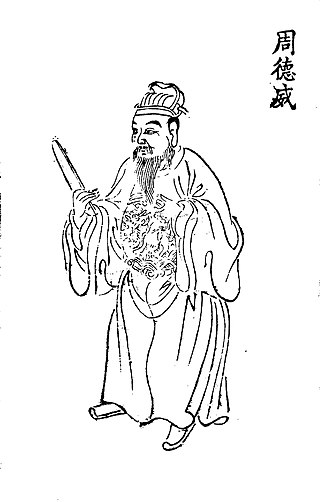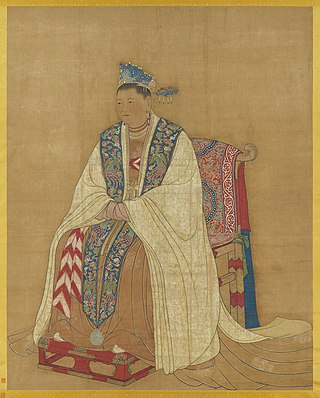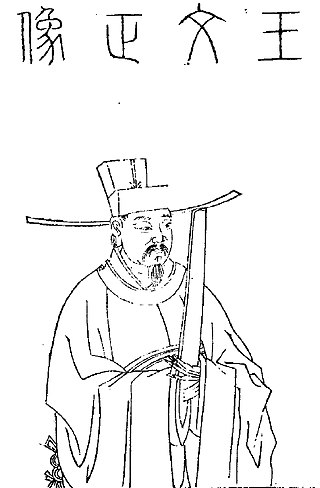
Emperor Wenzong of Tang (809–840), personal name Li Ang, né Li Han (李涵), was an emperor of the Tang dynasty of China. He reigned from 827 to 840. Emperor Wenzong was the second son of Emperor Muzong and younger brother of Emperor Jingzong. A rare occurrence in Chinese history, Emperor Wenzong, along with his elder brother Emperor Jingzong and younger brother Emperor Wuzong, reigned in succession.

Chai Rong, later known as Guo Rong (郭榮), also known by his temple name as the Emperor Shizong of Zhou, was the second emperor of the Later Zhou dynasty of China, during the Five Dynasties and Ten Kingdoms period. He reigned from 954 until his death in 959. He succeeded his uncle-in-law Guo Wei, whose surname he had adopted.
Emperor Xiaomin of Northern Zhou ( 周孝閔帝), personal name Yuwen Jue (宇文覺), nickname Dharani (陀羅尼), was the founder of the Xianbei-led Northern Zhou dynasty of China, ruling as Heavenly Prince. He was the heir of Western Wei's paramount general Yuwen Tai, and after Yuwen Tai's death in 556, his cousin Yuwen Hu, serving as his guardian, forced Emperor Gong of Western Wei to yield the throne to Yuwen Jue in spring 557, establishing Northern Zhou. Later in 557, however, Yuwen Jue, wanting to assume power personally, plotted to kill Yuwen Hu, who in turn deposed him and replaced him with his brother Yuwen Yu. Later that year, Yuwen Hu had Yuwen Jue executed.

The Water Margin is a 1998 Chinese television series adapted from Shi Nai'an's classical 14th-century novel of the same title. It was produced by CCTV with Zhang Jizhong as producer. It was first broadcast in China in January 1998. The series also featured action choreography by Yuen Woo-ping.
Guo Zhongshu, courtesy name Shuxian, was a Chinese painter, scholar, calligrapher and philologist during the Five Dynasties period and Song dynasty. He was noted for his paintings of landscapes and structures.

Emperor Zhenzong of Song, personal name Zhao Heng, was the third emperor of the Song dynasty of China. He reigned from 997 to his death in 1022. His personal name was originally Zhao Dechang, but was changed to Zhao Yuanxiu in 983, Zhao Yuankan in 986, and finally Zhao Heng in 995. He was the third son of his predecessor, Emperor Taizong, and was succeeded by his sixth son, Emperor Renzong at the end of his reign. From 1020 he was seriously ill, but retained power despite this. Because of his illness, day-to-day rule of China was often placed in the hands of his third wife, Empress Liu.

Empress Zhangxian Mingsu, more commonly known as Empress Liu (劉皇后), was an empress of the Song dynasty, married to the Emperor Zhenzong in 1012 and quickly gained the emperor's trust to discuss government matters. She ruled unofficially as the regent of China during the illness of Emperor Zhenzong from 1020 until 1022, and then officially as regent during the minority of Emperor Renzong from 1022 until her own death on 30 April 1033. As a regent, she commanded in her own name, not the name of the young emperor; she became the second woman in Chinese history to wear the imperial robe, after Wu Zetian, the only empress regnant in Chinese history.

Zhou Dewei (周德威), courtesy name Zhenyuan (鎮遠), nickname Yangwu (陽五), was a Chinese military general and politician of the Chinese Five Dynasties and Ten Kingdoms period state Jin.

Yang Yanzhao (楊延昭), named Yang Yanlang (楊延朗) before 1012, was a military general in ancient China's Northern Song Dynasty. For over 2 decades he defended Song's northern border against the Khitan-ruled Liao Dynasty, helping Song thwart Liao's repeated invasion attempts between 999 and 1004.
Wang Qinruo, courtesy name Dingguo, was an official in China's Northern Song Dynasty. He was the chancellor from 1017 to 1019 during Emperor Zhenzong's reign and from 1023 to 1025 during Emperor Renzong's reign.

Kou Zhun, courtesy name Pingzhong, was a much-praised official of China's Northern Song dynasty. He was the chancellor from 1004 to 1006 during the Emperor Zhenzong's reign.

Empress Dowager Du was an empress dowager of imperial China's Song dynasty. She was the wife of general Zhao Hongyin and the mother of Emperor Taizu of Song, who founded the Song dynasty.
Fàn Zhi, formally the Duke of Lu (魯國公), was a Chinese essayist, historian, jurist, and politician who served under 12 emperors of 6 dynasties during imperial China's Five Dynasties and Ten Kingdoms period and the subsequent Song dynasty. He was the Later Zhou chancellor from 951 until 960, and the Song dynasty chancellor from 960 until 964, not long before his death. A strict adherent to legal guidelines, he had influenced Later Zhou and Song rulers to rely more on civil administration in an age dominated by the military. Fàn was a member of the elite Fàn family.
Ding Wei, courtesy name Gongyan, was a Song dynasty chancellor, who dominated the courts during Emperor Zhenzong's later reign and Emperor Renzong's early reign.
Zhou Huaizheng was a powerful Song dynasty palace eunuch during Emperor Zhenzong's reign. After Emperor Zhenzong's illness in 1019 made him incapable of ruling, state power gradually fell to the hands of his wife Empress Liu and chancellor Ding Wei. Zhou plotted to assassinate Ding so that Kou Zhun could return to chancellorship, but his coup failed. He was arrested by Lei Yungong and executed.
Guo Chong, known as Guo Chongwei before 951, was a military general and officer who successively served the Later Tang, Later Jin, Later Han, Later Zhou and Song dynasties. He was likely an ethnic Shatuo.

Shen Lun, known as Shen Yilun before 976, was a scholar-official who successively served the Later Han, Later Zhou and Song dynasties. He was one of the Song dynasty grand councilors between 973 and 982.

Wang Dan, courtesy name Ziming, was a major politician in the Song dynasty, serving as the grand councilor from 1006 until shortly before his death in 1017. Well trusted by Emperor Zhenzong, Wang Dan was given plenipotentiary authority over some matters after 1008.
Lu Zhen (c.957–1014), courtesy name Zifa, was a Song dynasty scholar-official, historian, poet and diplomat. He was famous for his writings, including Jiu Guo Zhi, a history book on the Five Dynasties period.
Zhang Zhao (894–972), known as Zhang Zhaoyuan before 947, courtesy name Qianfu, was a Chinese scholar-official, historian, and poet during the Five Dynasties period and early Song dynasty. He served in the imperial government of the Later Tang, Later Jin, Later Han, Later Zhou and Song dynasties. Today, Zhang Zhao is best known for his contributions to Tang dynasty and Five Dynasties history, as a main author of Old Book of Tang and many Veritable Records since Li Siyuan.